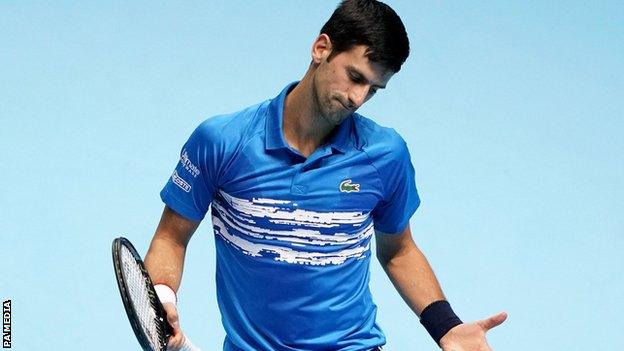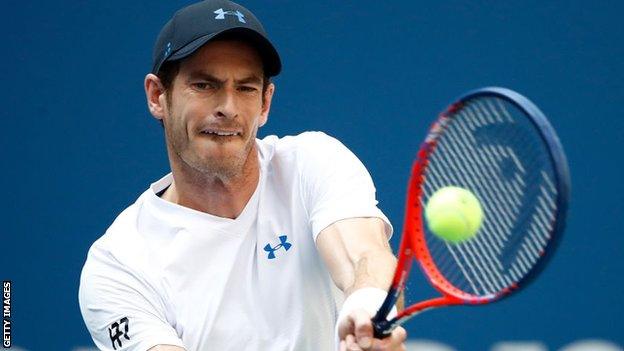US Open: Organisers confirm major will be staged but not everybody is on board
- Published

Three-time winner Novak Djokovic has been critical of the restrictions US Open organisers plan to have in place
The US Tennis Association played its trump card at the very first opportunity.
At a news conference to confirm the US Open will go ahead in New York this summer, Serena Williams popped up on the screen to say she cannot wait to take part.
The six time champion, who has had the Flushing Meadows surface shipped to her home for practice, will be trying once again to tie Margaret Court's record of 24 Grand Slam singles titles.
Canadian Bianca Andreescu followed hours later with confirmation that she will defend her US Open title.
The USTA is hoping their confidence will rub off on others.
There has already been strong public opposition to staging the US Open from Novak Djokovic and Nick Kyrgios, and reticence from Rafael Nadal, Ashleigh Barty and Simona Halep.
Their caution is understandable. If you were to take a holistic approach to the return of professional tennis, you would not start in the United States. Europe is currently a much better bet, as tournament directors in Paris and Madrid draw up plans that even include spectators.
They may remain uncomfortable with the number of Covid-19 cases the United States is reporting; they may not wish to spend weeks away from their family; or perhaps they would prefer to direct all their energies towards the French Open, which will start just 13 days after the curtain falls in New York.
But their sentiments should not divert attention from the fact that many other top 100 players are enthusiastic and relieved that the show is back on the road.

Andy Murray last played at the US Open in 2018
Expect a strong British contingent, for example. Both Andy Murray and Johanna Konta seem happy to travel, with Murray said to be keen to play both the US Open and Roland Garros if his gradual recovery from hip surgery continues to go to plan. And Dan Evans would love to be there: he told BBC Radio 5 Live last month that a final without fans in the Arthur Ashe Stadium would soon become "iconic".
Some big names, I am sure, will stay away. But with the US Open still 11 weeks away, and the daily number of reported new Covid-19 cases in New York now below 1,000 (from a mid-April high of over 11,000), others may come to assess the risks differently in time.
The initial safety protocols have already changed quite markedly. There is no longer the need to catch a specially-chartered flight to New York, and those that have the budget will now be able to bypass the official hotels by renting a private house.
So a player could then find space for their coach, hitting partner, physio, fitness trainer, agent, chef, partner, children and nanny, even if the USTA is yet to decide how many of those will be welcome on site.
And what happens, I wonder, if the 19-time Grand Slam champion Nadal decides to play? Does the 17-time Grand Slam champion Djokovic now think he can't afford to stay away?
The top 128 or so players who are eligible for the main draw are the lucky ones. There will be no qualifying in New York this year, which deprives players ranked down to around 250 the chance to earn Grand Slam prize money and ranking points which can make or break a season.
There is a lot of unhappiness among this group. "Cheers to ATP and US Open for further perpetuating my unemployment," posted the American world number 195 Mitchell Krueger.
Canada's top-10 doubles player Gaby Dabrowski, meanwhile, was pointing out how the absence of qualifying and the reduced size of the doubles draws "increase the lack of parity in tennis".
"We don't want to disproportionally move the needle even further, creating a bigger gap between those at the top and those who need the income and opportunity for growth," she argued in a post on Twitter.
There will, though, be $6.6m in compensation for these players - either in direct grants or in the form of extra prize money for future tournaments. All the feeder tours will be up and running by 17 August at the latest, but how the rankings will be restarted after a five month hiatus is not something the tours have yet figured out an answer to.
Looking further ahead, the WTA is pushing ahead with six weeks of tournaments in China, which are the lifeblood of the tour. The men may well head to Beijing and Tokyo after Roland Garros, but those events are yet to be confirmed.
The hope is, though, that the O2 in London will be able to round off the season by staging the ATP Finals for a 12th and final time. Broadcast contracts mean playing behind closed doors could still be worthwhile, although there have recently been one or two encouraging noises from government that a limited number of spectators could still be welcome.